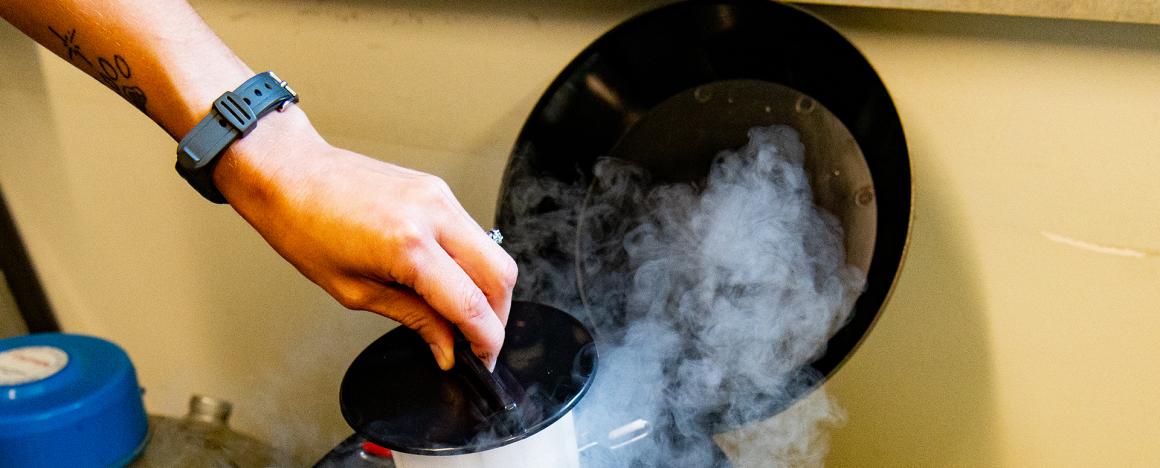Assisted Reproductive Technology for Sheep & Goats

Breeding Soundness Examinations of Rams & Bucks
It is important to determine a ram or bucks fertility level before purchase or use with a herd or flock. Tufts Veterinary Field Service offers breeding soundness exams (BSE), which includes a full physical examination of the male and semen analysis. Conformation, scrotal circumference and semen quality are evaluated and the owner is provided with a full report.
A BSE may be done on-farm or as a haul-in service, however having the exam done at Tufts Veterinary Field Service clinic produces a more detailed report. Semen parameters such as concentration, morphology (correct formation of sperm) and motility (correct movement of sperm) may be evaluated more closely at the clinic.
Tufts Veterinary Field Service also has the benefit of having Dr. David Matsas, a Board Certified Theriogenologist (veterinarian specializing in Reproduction Medicine) on faculty.
Semen Collection and Cryopreservation
Tufts Veterinary Field Service offers semen collection and cryopreservation (freezing) for clients looking to use their own genetics for artificial insemination, would like to preserve genetic access to a specific male, or would like to sell semen from high quality rams or bucks.
In this process, a small group of females are synchronized by the client to be in estrus (heat) in order to entice the male at the time of collection. These females are brought to the clinic along with the male(s) to be collected. Due to biosecurity concerns, Tufts Veterinary Field Service does not offer females, they must be provided by the client.
If semen is being cryopreserved for sale, any desired health testing may be completed on the buck immediately after semen collection at the clinic. Tufts Veterinary Field Service offers short-term cryopreservation storage of semen and/or embryos for clients. Please ask the office for options for long-term frozen storage.
Artificial Insemination
Tufts Veterinary Field Service offers both laparoscopic and transcervical artificial insemination for small ruminants. Please call the office to schedule an on-farm or haul-in appointment, and to obtain protocols for synchronizing females prior to AI. If needed, frozen semen shipping or fresh semen collection may be coordinated with the AI appointment. The clinic offers short-term semen storage facilities for use prior to AI.
The primary advantage of artificial insemination in small ruminants is to obtain specific genetics and to improve production performance. It may also be more economical for clients that cannot easily obtain and house bucks and rams for breeding.
Embryo Collection, Transfer and Cryopreservation
An advanced specialty service offered by Tufts Veterinary Field Service is small ruminant embryo collection. This process allows our veterinarians to obtain multiple fertilized embryos from a single mating of a dam and sire. Embryos which are collected may result from natural breeding on-farm, or from artificial insemination of fresh or frozen semen. Clients may use embryo collection to preserve and sell their own genetics, or to quickly introduce high-quality genetics from a particular sire into their flock or herd.
After collection, resulting embryos may either be cryopreserved or transferred into recipient (surrogate) females. Embryo transfer is also used by clients purchasing frozen embryos and transferring them into their own recipients. Many small ruminant owners in the Northeast have been interested in embryo collection and transfer services due to the recent change in federal regulations which allows frozen embryos and semen to be imported from the UK and Europe. This infusion of new genetics may be invaluable for certain small ruminant herds and flocks.
Please call the Tufts Veterinary Field Service office to obtain more information about embryo collection, embryo transfer and embryo cryopreservation (freezing) options. Our veterinarians will answer all of your questions and help you determine which services are best suited to help you meet your production goals.